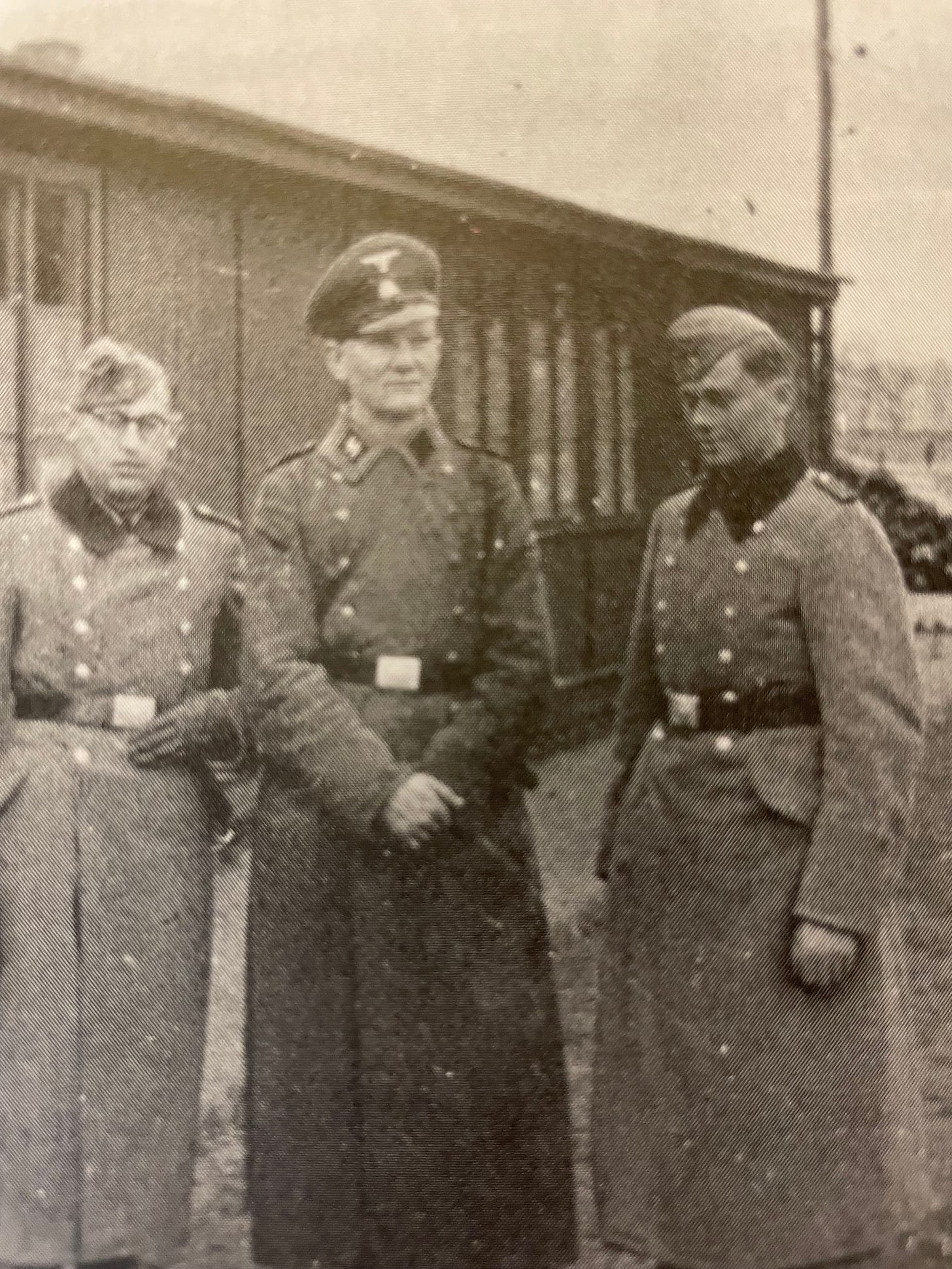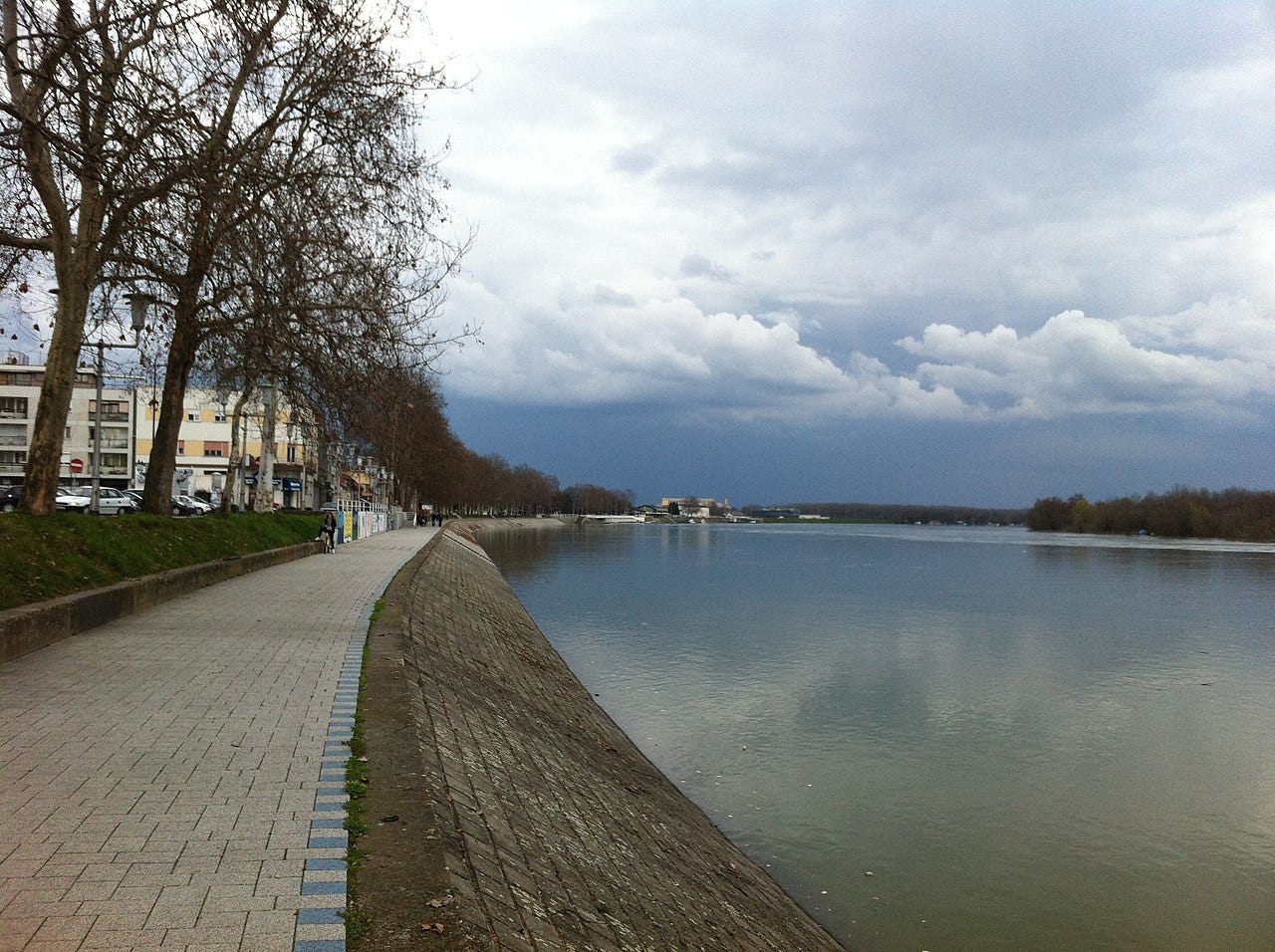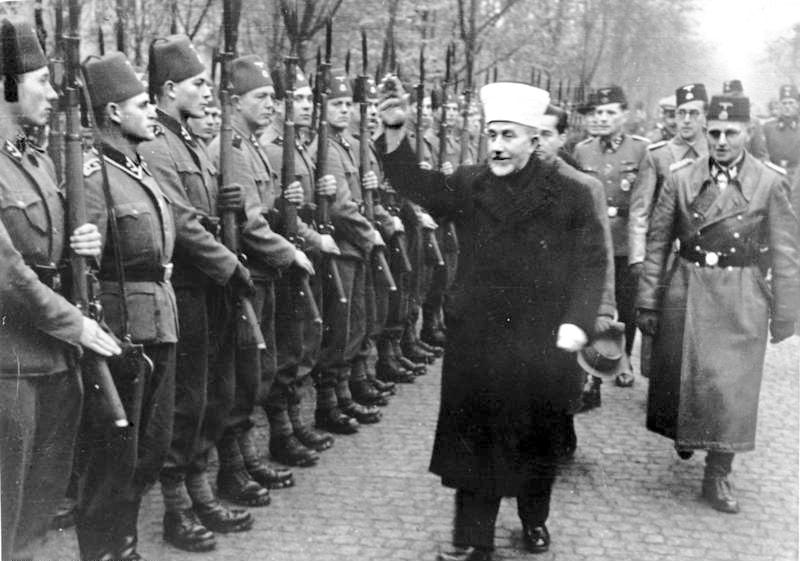This is a special preview of what is next in store for History Impossible’s mainline series, as a thanks for everyone’s patience. We have finally reached the point where the original inspiration for this series—that is, the titular “Muslim Nazis” themselves—arrives. The Division known as Handschar (the Germanized Serbo-Croat word for “sword”) had thousands of members, as well as many members, but only one saw fit to record his experiences (and life story) for posterity many years later and to have it translated into English by a tiny independent publisher in the United Kingdom (many thanks to Loyalty and Honour Publishing for making this available). That man’s name is Zvonimir Bernwald, and his experiences, while unique to his own life circumstances, reflected the experiences of many of the men in this division—Muslim and Volksdeutsche alike.
Zvonimir has served as the human element of this part of the story, which has immensely helped with so much of this story being drowned in context—in this particular case, the Yugoslav Civil War of 1941-1945, the Independent State of Croatia, the Muslim Autonomists of Bosnia, the SS and its leadership, and of course, the strange connection to Palestinian nationalism by the figure cut by the Grand Mufti of Jerusalem, Hajj Amin al-Husseini (still a character in his own right). Zvonimir, however, was a man on the ground—he saw the things and lived through the things the most famous division of Muslim SS fighters took part in. He was able to paint a picture of life in Bosnia and Croatia during this time, capturing the fear and uncertainty that punctuated everyday experiences, as well as the tragedy of families rent apart by loyalties (his own brother had joined Tito’s Partisans, the people the Handschar were formed to destroy).
Zvonomir features heavily in the upcoming episode of History Impossible. I wanted to give a snapshot of his experiences, with more to possibly follow for paid subscribers if there is enough interest as I put this newest beast of an episode together. Thank you as always for your patience.
—AVS
Zvonimir Bernwald remembered growing up in a “tight-knit world.” It was a world like many other kids’ worlds in the 1920s and 1930s. School, friends, skinned knees, cuffed ears, unwanted dinners, running through backyards and fields, riding bicycles (or envying those who had them). It likely looked as it always does in places and times like this: gangs of kids, seemingly right out of Lord of the Flies, having the run of the neighborhoods and villages in which they lived. Also like a lot of kids all over the world and even to this very day, Zvonimir was distinctly aware of the gap that existed between those who had money and those who had little. It made him wonder, in his words, “if the ‘good old days’ really were that good.” However, continuing in his memoir, Zvonimir would describe his life in a relatively idyllic way coupled with his class consciousness:
At that time, we lived in a fixed world order: there were rich and poor. But we “poor” were sometimes much happier than the “rich.” We were allowed to play as we wanted and where we wanted. In our dirty and sometimes torn clothes, the world was ours. We were able to develop freely and were free within our environment; lofty material interests were unknown to us. So it was for almost all neighboring children and later also the classmates in high school. There were also children of wealthy farmers who had to travel to school by train every day, both in summer and in winter. We could tell by their clothes who the peasant children were. Although they were consistently the most intelligent disciples, once a teacher dropped the remark: “They smell like the Opanke.” [Opanke were the typical footwear of Slavonian peasants at the time]. In the fourth grade of secondary school, only one student had a Kodak Retina camera and two others had bicycles. We were all alike at the time; we did not know envy. We were all the same poor, but still happy and relaxed.
Zvonimir’s memory makes me think of so many things. My own life, honestly, comes to mind. I grew up reasonably middle class on the south side of Minneapolis, maybe ten to fifteen minutes away from the city center. Most of my friends and I came from similar backgrounds, but like Zvonimir writes, we were all alike in our own eyes. Class consciousness was not a thing; difference is noticed, but never anything resembling what the adult world calls “injustice” or “inequality.” Questions of fairness are the beginning and end of the conversation when you're a child, and that stuff tends to resolve itself (at least among boys) either through back-and-forth demands or, if the situation called for it, tiny, ineffectual punches followed by tattling. In the end, there is nothing particularly disunifying by things like this; it was just the way things were and we were always looking forward to the next day.
More broadly, though, Zvonimir’s memory makes me think of the exhilaration that we all feel, however fleetingly, when we realize how free we can be. The taste of freedom is a phrase I've heard many times in many different contexts—from graduating high school, to escaping prison to, more to the point, achieving independence as a nation. The young Zvonimir certainly didn't think about it that way, but many people—the adults—around him certainly did, especially as the 1930s progressed and the country around them continued its slow-motion disintegration. That country was the short-lived Kingdom of Yugoslavia, whose experiment with parliamentary democracy had barely lasted a decade before chaos had erupted on the parliament's floor and the Serbian King had ended the democratic experiment that the nationalists of all flavors—Serb, Croat, and Bosnian alike—had seemed dedicated to challenging. Zvonimir lived among all of these people, living as he did in the most mixed part of the kingdom that was Bosnia.
Zvonimir was not Muslim—he was, in fact, Volksdeutsche, an ethnic German, like many thousands more living in the Region. He knew very little of the Muslim autonomist movement of his country—of Bosnia—attempting to obtain freedom from the shackles of Serbian domination. And later, after war exploded over the land and Nazi Germany divvied up the spoils and Bosnia became part of the brutal Ustashe regime, Croat tokenization and Serb reprisal; he had little concern over this mission of Bosnian autonomy. His main concern would be the war itself, as it was for most young men living in the former Kingdom.
However, that Muslim autonomist movement would come to define many of those young men's lives, thanks to the alliance they managed to strike with a very particularizing and powerful figure among the occupying Nazis: that is, the Reichsfuhrer-SS Heinrich Himmler. Himmler's love of Islam, and Orientalist vision of marrying National Socialist ideology with Islamic aesthetics in this nominally Muslim land would, in partnership with this autonomist movement in Bosnia, dictate the fate of tens of thousands of young men like Zvonimir Bernwald, whose idyllic childhood and adolescence would become a true object lesson in contrasts.
In December of 1943, at the age of 19, Zvonimir had gone home to Slavonski Brod via Zagreb to visit his parents for the Christmas holidays. As he explained, this visit, while one he looked forward to, was ultimately “a frosty, dreary, sad Christmas.” His older brother Nikola, after all, had joined in the fighting against the occupying Nazi and puppet Ustashe forces with Tito’s Partisan movement. As Zvonimir remembers, “there was no talk about this topic.” His father said nothing, and neither did his mother, though her sadness and worry were etched across her face. The uncertainty, fear, and divided loyalties existed throughout Zvonimir’s hometown, leaving the city feeling vacant and ghost-like.
He was always aware that “partisan raids were everywhere,” made more aware by the fact that some of his classmates, like his brother, had joined them in their fight against the fascists; some had joined the Ustashe, those fascists; others, though not as many, were like Zvonimir. That was another strange contrast that existed in this place and in this brief window of time; people you knew from life before the war were still the same people, and yet, their priorities may have completely shifted to the point where, at least in terms of their actions, they would be a stranger to you; perhaps even an enemy. It's everything and nothing like that moment today when you go to a dinner party and you realize there could be tension if they knew who you voted for in the most recent election; everything because of the tension, nothing because, unlike it was in Zvonimir's day and home, it could cost you your life. Zvonimir remembers a moment where this reality came crashing down upon his shoulders during that Christmas visit:
One evening, in a coffee house, I met a girl I knew from before, but whose political attitude was unknown to me. After an animated and lively conversation in which I bragged about my soldierly experiences, she asked me to accompany her home. She lived at the other end of town, outside a settlement. The street lighting was very sparse and the uneven walkway was full of holes. That did not bother me initially, because I had a nice evening with her already. However, when we arrived at the last houses, she replied to me that we had to go to her house a few hundred unlit meters away. That's when I got scared. Was she possibly a partisan and the whole thing a trap? It would not have been the first time that a German soldier disappeared without a trace at night. So I quickly stopped, turned around, and ran as fast as I could back towards the city center.
Christmas came and went, and so did the New Year, with Zvonimir returning to Neuhammer in early January 1944. At that point, Neuhammer was the only truly safe harbor for men like him; Germans, namely, from the former Yugoslav kingdom who were now serving in the Third Reich's military. And not just the military, but supposedly the most elite wing of that military, the Schutzstaffel, or the SS. And not just the SS, but a very particular part of the SS, made up predominantly of men from the same part of the old kingdom as Zvonimir; the part where the Sava River divides Croatia from Bosnia, with both cities—Slavonski Brod and Bosanaki Brod—separated by only four and a half kilometers. Zvonimir was indeed Volksdeutsche, like many men serving the Third Reich who hailed from Bosnia and Croatia, but the division Zvonimir was part of was not defined by their German character.
The division was, in fact, very distinct in its seemingly foreign character, made all the more distinct by the uniform they all wore, that was topped off with a fez one might expect to see in a film taking place in the Middle East, and one that included a patch that a saber. Officially, the Division was called the 13th Waffen-SS Mountain Division; colloquially, it was known as the Handschar. Nothing characterized the Division's character more aptly than the speeches given at a feast known as the Bairam, a festival that takes place at either the end of Ramadan or the end of the Islamic calendar, the latter known as the Eid al-Adha. These speeches became commonplace with this Division, because the Division was, by in large, one defined by Islam, because this Division was mostly made up of Muslims from Bosnia.
The Muslims in the Division were far more eager to return to Bosnia than Zvonimir. He had been able to see his family for the Christmas holidays, and despite the divides that rent his hometown and even his family, with some being part of the Ustashe, some part of the Partisan forces, and some, like him, in the employ of the Nazis, he did not possess the same sense of urgency as his Muslim comrades. But his comrades were, in the words of military historian Jonathan Trigg, “extremely eager to finish their training, get home, and safeguard their families and friends,” because, after all, “everyone knew how bad things were back in Bosnia.” And they were bad; Muslims were dying at the hands of the Serbian royalist Chetniks, but also the Partisans and even at times the supposedly pro-Muslim Ustashe. They had no one to protect them. This was made clear in one of those speeches given at the 1943 Bairam festival by one of the Divisional Imams, Abdulah Muhasilovich, who proclaimed:
The Muslims of the whole world are in a terrible fight for life and death. Today, a battle of gigantic proportions is being conducted that has not yet been equaled in recorded human history. The whole world has divided into two camps. Some are under the leadership of the Jews, whom God says in the Quran: They are God's and your enemies. And these are the English, Americans, and Bolsheviks, who fight against faith, against God, morality, and a more just order. On the other side is National Socialist Germany with its allies, under the leadership of Adolf Hitler, who fight for God, faith, morality, and a more beautiful and just order in the world, and for a fair distribution of all goods that God has created for all people. As we observe this Bairam feast with good food, and even havla, an entire army of our brothers, our refugees, wander about from city to village, wrapped in rags, barefooted, hungry, and cold. Their Bairam feast will be spent in misery and distress. It is even sadder that Chetniks and Partisans carry on their activities, murdering and plundering wherever they go. But we call out to them, 'You can murder and plunder, but the day will come when the tables are turned!' And to you, dear and beloved Bosnia, we appeal to you, our beloved parents, wives, and children—be patient and ask our God that we finish our training quickly. We will then return and thrash our enemies with the courage of lions, and liberate our cities and villages: our Bosnia!
Zvonimir was among the thousands of men present who heard this speech given that day, despite his non-adherence to the Islamic religion, and even he recognized its power, remembering that it “certainly left a deep impression on the Division's soldiers,” thanks largely to “the hope for the success of Kompanie” still being present. It would not always be this way. However, also witnessing this speech, and clearly having approved of it, was a man wrapped tightly in a great coat, tarbush atop his head, his breath steaming in the winter air. He had inspected the Division; he had approved of it; he had expressed this approval to his friend, the Reichsfuhrer-SS Heinrich Himmler. Zvonimir didn't remember much about this man, except that his speeches gave the 19-year-old the impression of him being a “‘church person,’ similar to the bishop from Djakovo.”
He also remembered this man as being “small in stature and the white beard [he had] made him look a lot older,” and as someone who “spoke in a monotonous way that put our patience to the test, because we did not understand Arabic.” The man's presence was not unwelcome—he had brought gifts of honey and large amounts of tobacco for all the men to enjoy—and everyone knew he was important, especially in the context of Islam; he was consistently called the “Grossmufti” by the officers who introduced him and he was, indeed, clearly friends with the Reichsfuhrer. But Zvonimir and his comrades had no idea how far this man—Hajj Amin al-Husseini, the Grand Mufti of Jerusalem—had come, and how much influence he had truly exerted, including in bringing all these men—these sons of Bosnia—together, to fulfill his and the Reichsfuhrer’s mission of bringing Islam and National Socialism into one large family.









